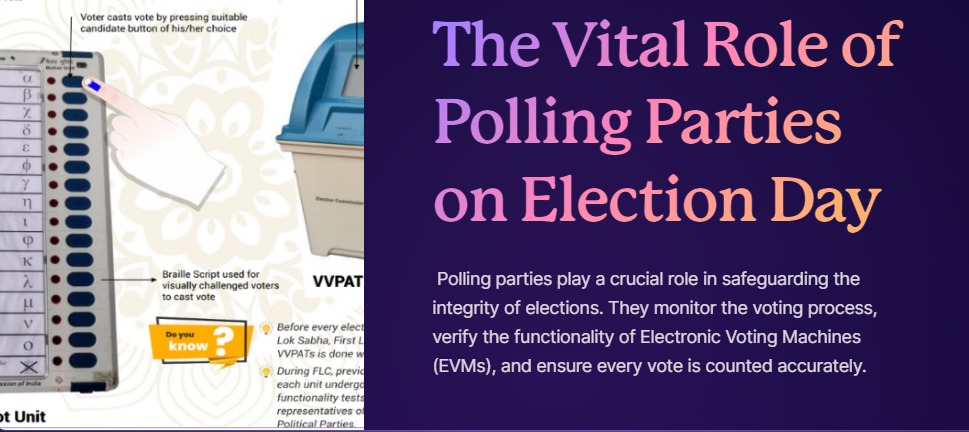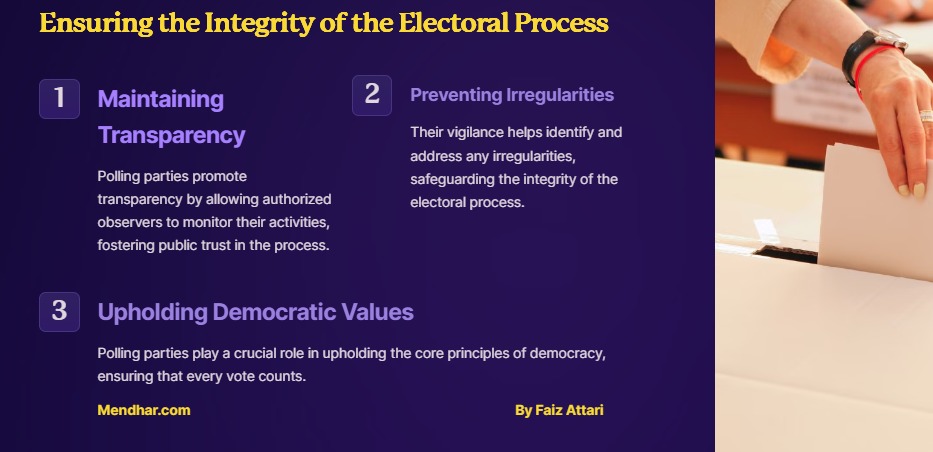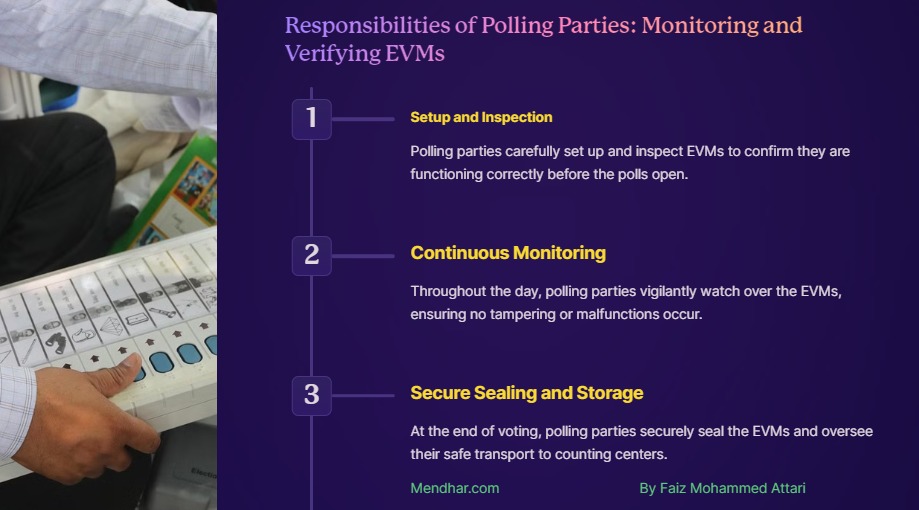The Role of Polling Parties on Election Day: Safeguarding the Integrity of EVMs

On the day when nations exercise their democratic right, the spotlight often falls on the candidates and the voters. Yet, behind the scenes, an array of unsung heroes work tirelessly to ensure the sanctity and smooth functioning of the electoral process. Among these essential figures are the polling parties, a dedicated group entrusted with the critical responsibility of managing Electronic Voting Machines (EVMs) – the cornerstone of modern elections.
Polling parties consist of various officials, including presiding officers, polling officers, and support staff, each playing a distinct role in the electoral process. Their journey begins well before election day, involving rigorous training sessions to familiarize them with the operations and troubleshooting of EVMs. These machines, designed to ensure a transparent, swift, and accurate voting process, are central to the integrity of contemporary elections. Thus, the training is comprehensive, covering not only technical aspects but also the procedural and legal protocols essential for managing the voting process.
On election day, the responsibilities of polling parties are multifaceted and demanding. Arriving at the polling stations early in the morning, they set up the EVMs, ensuring that each machine is correctly configured and tested before the voters arrive. This task requires meticulous attention to detail, as even minor errors can disrupt the voting process or lead to disputes.
Throughout the day, polling officers manage the flow of voters, check identification documents, and maintain order within the polling station. They play a crucial role in assisting voters, especially those who are elderly or differently-abled, ensuring that everyone can exercise their right to vote without impediment. The presiding officer oversees the entire process, addressing any issues that arise and ensuring compliance with all electoral guidelines.

Understanding the Role of Polling Parties:
Polling parties comprise dedicated individuals meticulously trained to oversee the electoral process. Their tasks range from setting up polling stations to conducting the voting process smoothly and securely. At the heart of their duties lies the management of EVMs, ensuring they function accurately and transparently throughout the day.
Setting Up the EVMs: Precision and Diligence:
Before the first voter steps in, polling parties meticulously set up each EVM unit. This process involves rigorous testing to ensure every vote cast is recorded accurately. From verifying the machine’s functionality to sealing it securely, every step is crucial in upholding the integrity of the electoral process.
Ensuring Transparency and Fairness:
Transparency is paramount in any democratic exercise. Polling parties play a pivotal role in maintaining transparency by allowing representatives from various political parties to inspect the EVMs before polling commences. This ensures that no tampering has occurred and builds trust in the electoral process.
Managing the Voting Process: Efficiency and Order
As voters queue up to cast their ballots, polling parties oversee the smooth functioning of EVMs. They guide voters through the process, ensure secrecy, and address any technical issues promptly. Their efficiency and commitment contribute significantly to the orderly conduct of elections, fostering a sense of trust and confidence among voters.

Counting the Votes: Accuracy and Integrity:
Once the voting concludes, the real test begins for polling parties – counting the votes. With meticulous attention to detail, they tally the votes recorded by each EVM, ensuring accuracy and integrity in the final count. This stage is critical in determining the outcome of the election and demands unwavering dedication from every member of the polling party.
Safeguarding Against Malpractice:
Throughout the day, polling parties remain vigilant against any attempts at malpractice or tampering. From safeguarding the EVMs to reporting any suspicious activities, they serve as guardians of electoral integrity. Their diligence ensures that every vote counts and that the will of the people remains sacrosanct.
The Evolution of Election Technology: Embracing Change
In an era of rapid technological advancement, EVMs represent a significant evolution in the electoral process. While some may harbor doubts about their reliability, the role of polling parties in ensuring their proper functioning cannot be overstated. As technology continues to evolve, so too must the training and preparedness of polling parties to adapt to new challenges and safeguard the democratic process.
Conclusion: Upholding Democracy, One Vote at a Time:
On election day, as citizens exercise their right to vote, polling parties work tirelessly behind the scenes to ensure a free, fair, and transparent electoral process. Their dedication, integrity, and commitment to upholding democratic principles are the cornerstone of any successful election. As we celebrate the vibrancy of democracy, let us not forget the indispensable role played by these unsung heroes in safeguarding the integrity of our electoral system.



